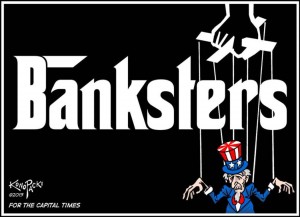
After the nation's financial giants single-handedly brought the U.S. economy to its knees in the late 2000s, the Madison-based Center for Media and Democracy started a new website it labeled "BanksterUSA."
There were many who found the name — a combination of bankers and gangsters, of course — a bit over the top. Sure, these wheeler-dealers manipulated markets, sliced and diced mortgages and played loose with other people's money, but to imply they're gangsters?
Now, based on a new report in The New York Times, I wonder whether those folks might be changing their minds.
According to a Times investigation, the too-big-to-fail banks aren't content with just a barrage of bank fees and credit card penalties to relieve consumers of their money these days. They've figured out ways to game the commodities markets.
An example is the financial giant Goldman Sachs, which owns a bunch of industrial warehouses near Detroit where aluminum ingots are stored. Every day, according to the paper, a fleet of trucks shuffles 1,500-pound bars of the metal among the warehouses, two or three times a day.
"This industrial dance has been choreographed by Goldman to exploit pricing regulations set up by an overseas commodities exchange," the Times said its investigation found. "The back-and-forth lengthens the storage time. And that adds many millions a year to the coffers of Goldman, which owns the warehouses and charges rent to store the metal."
It also increases the prices paid by manufacturers and consumers for products that use aluminum — soda and beer, for instance.
Unfortunately, this is just one example. The maneuvering in markets for oil, wheat, cotton, coffee and more has brought billions in profits to investment banks like Goldman, JPMorgan Chase and Morgan Stanley, the newspaper reported.
The door to this kind of activity was opened by Congress, naturally, when it approved relaxed regulations that allowed the banks to buy warehouses and other facilities used to store commodities. In the case of Goldman's aluminum warehouses, the story added, customers used to get the metal in roughly six weeks, but now must wait several times longer. There's more money to be made in longer storage. Since the story ran, federal regulators are nosing around and one bank, JPMorgan Chase, has said it will leave the commodities exchange.
But, it seems that stories like this are never-ending. Banks were organized — and many of the community banks that serve our local towns, villages and cities still are organized that way — to accept money from savers and to lend it to businesses and consumers in loans. The interest on those loans pays the interest on the savings accounts and the costs of running the bank.
But, thanks to unbridled mergers and buyouts, a huge chunk of the nation's economy is now in the hands of a few mega-banks that seem to consider traditional banking a necessary sideline. And worse, when they do wrong like they did during the years leading up to the financial crisis in 2007 and 2008, the taxpayers are expected to bail them out — and they're allowed to continue on their merry way to more record profits.
Anyone still believe that banksters isn't the proper word?
Dave Zweifel is editor emeritus of The Capital Times. dzweifel@madison.com